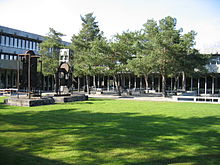The Faculty of Social Sciences, University of Helsinki, invites applications for the position of
POSTDOCTORAL RESEARCHER
for a two-year, full-time, fixed-term period starting 13 September 2021 (or as agreed).
The appointee will work at the Institute of Criminology and Legal Policy (KRIMO) in the research group of associate professor Antti Latvala. Latvala’s research utilizes nationwide register data from Finland and Sweden and family-based, genetically informed research designs, as well as other quasi-experimental methods to study criminality, mental health, and related factors. The appointee will contribute to a beginning project examining effects of parental incarceration on offspring mental health, criminality and developmental outcomes, or other criminality-related research projects. The appointee is expected to publish the results in top-level international peer reviewed scientific journals. The projects may include collaboration with researchers at Karolinska Institutet in Stockholm, Sweden.
The position of a postdoctoral researcher is typically held for three to five years after the completion of a doctoral degree. The aim of the position is to encourage the appointee to further their skills and gain more experience to prepare them for an academic career. In addition to research, the duties include teaching and other tasks. Teaching tasks can account for up to 5% of the annual working time and take place in the context of the Bachelor and Master’s programs in Social Research, Faculty of Social Sciences. Other tasks may include contributing to ongoing projects in the research group as well as preparing grant applications.
QUALIFICATIONS
The appointee needs to hold a doctoral degree in (Quantitative) Social Sciences, Criminology, Psychology, Epidemiology/Public Health, or other relevant field; have strong quantitative methods skills and an excellent command of written English as demonstrated by published studies in peer-reviewed journals, and have experience working with large-scale quantitative datasets. The postdoctoral researcher is expected to be highly motivated to pursue an academic career.
WHAT WE OFFER
We are an equal opportunity employer and offer an attractive and diverse workplace in an inspiring environment with a variety of development opportunities and benefits. The annual gross salary range will be approx. € 41,000 – 50,000, depending on the appointee’s qualifications and experience. In addition, University of Helsinki offers comprehensive services to its employees, including occupational health care and opportunities for professional development. Further information at www.helsinki.fi/en/about-us/careers. The appointee is expected to reside in Finland while employed by the University of Helsinki. The Faculty of Social Sciences provides assistance in relocation. The employment contract will include a probationary period of six months.
HOW TO APPLY
Applicants are requested to enclose with their applications the following documents. Please compile all documents as a single pdf file.
1) A curriculum vitae, clearly indicating type and level of qualifications.
2) A list of publications (please indicate three most important publications to be considered for the position).
3) A statement (max 1 page) explaining the applicant’s motivation to apply for the position and how his/her expertise would productively contribute to research on intergenerational effects in criminology or other criminality-related topic.
4) A summary (max. 2 pages) of the applicant’s scholarly activities including: summary of previous original research, academic networks and collaboration, disciplinary and interdisciplinary activities, success in obtaining research funding, and other relevant details.
5) Names and contact details for 1-2 references (please note that recommendation letters are not to be submitted at this stage).
For instructions about preparing the CV and list of publications, please see www2.helsinki.fi/en/faculty-of-social-sciences/faculty/applying-for-teaching-and-research-positions.
Please submit your application through the University of Helsinki Recruitment System via the link Apply for job. Applicants who are employees of the University of Helsinki must submit their application via the SAP HR portal, https://saphr.it.helsinki.fi/irj/portal. The application period closes on 15 August, 2021.
FURTHER INFORMATION
Further information about the positions and the research project may be obtained from associate professor Antti Latvala (antti.latvala@helsinki.fi), https://researchportal.helsinki.fi/en/persons/antti-latvala.
In case you need support with the recruitment system, please contact recruitment@helsinki.fi.
The University of Helsinki is the oldest and largest institution of academic education in Finland, an international scientific community of 40,000 students and researchers. In international university rankings, the University of Helsinki typically ranks among the top 100. The University of Helsinki seeks solutions for global challenges and creates new ways of thinking for the best of humanity. Through the power of science, the University has contributed to society, education and welfare since 1640.
The Faculty of Social Sciences is Finland’s leading research and education institution in the social sciences, and also the most diverse in terms of its disciplines. In several research fields the Faculty belongs to the top 50 in the international rankings. The Faculty has a strong international profile both in research and teaching programmes. The number of academic staff stands at 350. Each year the faculty awards some 350 Bachelor’s degrees, 400 Master’s degrees, and more than 40 doctoral degrees. For more information on the Faculty of Social Sciences, please visit www.helsinki.fi/en/faculty-of-social-sciences.
Due date
15.08.2021 23:59 EEST


